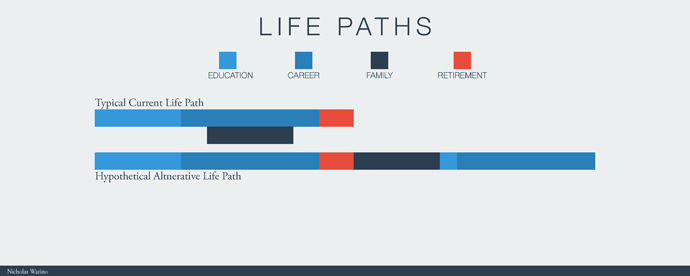How 1,000-year lifespans could remake the economy
Who wants to live forever?

A free daily email with the biggest news stories of the day – and the best features from TheWeek.com
You are now subscribed
Your newsletter sign-up was successful
If you're reading this, it's possible you'll live for a few hundred years. Maybe even thousands. Even better: you could live those years at your peak physical state.
At first glance, that's an absurd statement, going against the experience of all human history. However, Oxford University's Aubrey de Grey, a leading theoretician of aging, believes there is a 50 percent chance that someone alive today will live for 1,000 years.
Aging, according to de Grey, is essentially the lifelong accumulation of molecular and cellular damage throughout the body. Using stem cells, hormone therapies, anti-aging drugs, and more exotic techniques such as body-part replacement or even cloning, de Grey says doctors will soon be able to fix those problems before they can kill you. "The idea is to engage in what you might call preventative geriatrics," he says, "where you go in to periodically repair that molecular and cellular damage."
The Week
Escape your echo chamber. Get the facts behind the news, plus analysis from multiple perspectives.

Sign up for The Week's Free Newsletters
From our morning news briefing to a weekly Good News Newsletter, get the best of The Week delivered directly to your inbox.
From our morning news briefing to a weekly Good News Newsletter, get the best of The Week delivered directly to your inbox.
Much of the current research in the field is looking at organisms that are seemingly immune to aging, such as turtles, lobsters, hydras, and others, and looking at how these effects could be replicated in humans. If scientists can prevent aging completely, then 1,000-year lifespans and beyond — where people only die from injuries — could become commonplace.
We already expend much brain power analyzing and discussing the potential ramifications of possible-but-improbable events: catastrophic Asteroid impacts, actually building the Death Star, or even congressional Republicans compromising with Democrats. So why not also consider the consequences of a society that has conquered aging?
Now, extending lives to 1,000 years would change almost everything, from the average size of human families to metaphysical questions about existence. But I'm going stay in my lane and focus just on the economy. Here are four possible effects that I can envision:
1. Government budgets, fixed
A free daily email with the biggest news stories of the day – and the best features from TheWeek.com
There is a lot of concern about long-term debt levels. The long-term threats are basically the same everywhere: paying for health care for the elderly, paying for retirement, and a falling tax base due to rising levels of retirees could all overwhelm government budgets down the line.
Most health care spending goes toward treating chronic conditions during old age. If the engineering approach to anti-aging is successful, most if not all of these chronic conditions would be reversible and preventable. Routinely fixing damage is likely going to be a lot cheaper than trying to alleviate the pathologies of aging for decades.
Not only would public health bills fall, but the need for the public to guarantee minimum retirement income would disappear as well. The government could use this potential saving for lower taxes, or they could take their health care savings and send monthly checks to not only the elderly, but to all adults. (The latter is probably a better idea.)
2. A far larger supply of labor
If people don't need to retire due to aging, fewer will. This would put more pressure on a job market already straining from a competitive global economy and automation. Absent government intervention, this could cause some combination of rising unemployment and declining wages.
It's unclear which age cohort would suffer the most. The older but still vibrant cohort could have an insurmountable accumulation of skills and resources that the younger cohort could never compete with. Or instead of accumulating skills and resources, the older cohort could instead accumulate crippling biases and myopia, and become unfit in a rapidly shifting economy. Regardless, the supply of labor would significantly increase.
3. Increased productivity
One of the most notable and disturbing trends over the past 40 years is the growing gap between productivity and wages (in the U.S. and elsewhere). This is likely to continue. International competition will only grow with a rising global middle class. Computers will compete for more jobs. And if life-extending technologies are successful, then those over the age or 65 who used to retire would be able to do any job, only with a lifetime of experience. While this would be tough on labor income, it would also increase productivity.
The question is how much of that increased productivity would be captured by a small elite class, invested in socially beneficial areas (either privately or publicly), or taxed and redistributed to reduce growing economic inequality.
4. Financial planning for 1,000 years
Compound interest is an extremely powerful force, allowing one to accrue a fortune over a life and vaster fortunes over multiple generations. Of course, being able to work and live for a really long time would make saving extremely easy. But what would people save for?
Most lives today follow fairly normal patterns. Your first 20-25 years are learning how to exist in the world and developing skills to prepare yourself for the next 40-50 years of your life. Once you have enough experience, but before you start declining too much physically, you work for money to raise a family and save enough for when you can no longer work. If you're lucky enough to survive this long, you then spend your savings to keep you afloat as your health declines.
If anti-aging research develops as some predict, this pattern could change. The boundaries of growing up and growing old greatly limit our options in life. Our entire physical prime is spent figuring out our career path, earning money, raising a family, and saving. Removing the cap of old-age decline would open up a lot of possibilities. People could choose multiple careers and areas of study. They could also have more freedom over when to raise kids and when and how often to take long breaks (instead of a single retirement and annual small vacations). Your whole working life could change — as would the priorities you make at each stage of your life. Here's what a lifespan could look like:

Doesn't eternity sound fun?
Nicholas Warino is a political science Ph.D. student at the University of California, Riverside. His research interests are public policy, political economy, and technology.